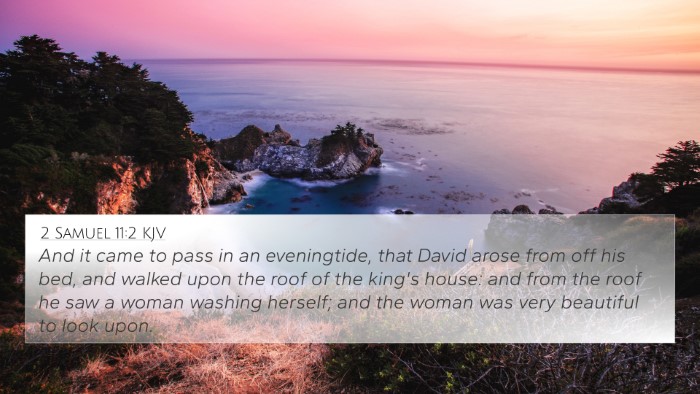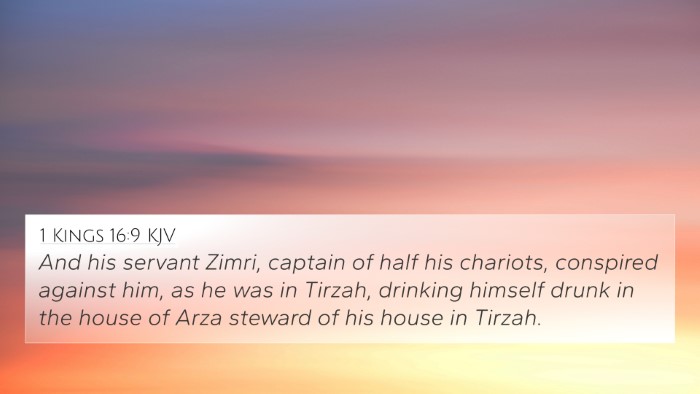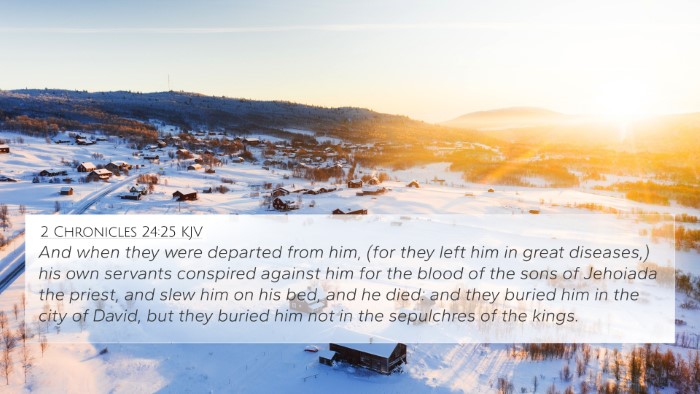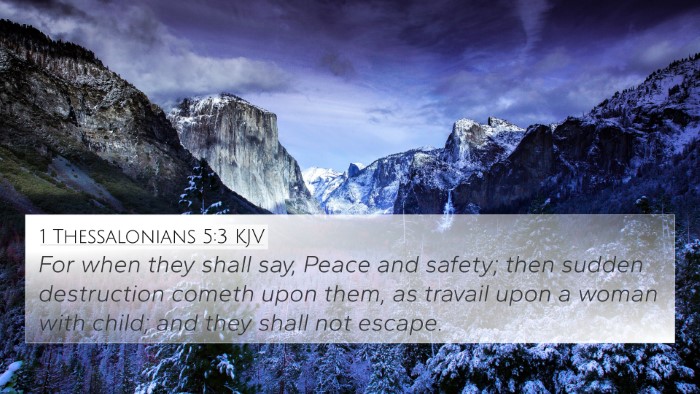Old Testament
Genesis Exodus Leviticus Numbers Deuteronomy Joshua Judges Ruth 1 Samuel 2 Samuel 1 Kings 2 Kings 1 Chronicles 2 Chronicles Ezra Nehemiah Esther Job Psalms Proverbs Ecclesiastes Song of Solomon Isaiah Jeremiah Lamentations Ezekiel Daniel Hosea Joel Amos Obadiah Jonah Micah Nahum Habakkuk Zephaniah Haggai Zechariah Malachi2 Samuel 4:5 Similar Verses
2 Samuel 4:5 Cross References
And the sons of Rimmon the Beerothite, Rechab and Baanah, went, and came about the heat of the day to the house of Ishbosheth, who lay on a bed at noon.
Uncover the Rich Themes and Topics of This Bible Verse
Listed below are the Bible themes associated with 2 Samuel 4:5. We invite you to explore each theme to gain deeper insights into the Scriptures.
2 Samuel 4:5 Cross Reference Verses
This section features a detailed cross-reference designed to enrich your understanding of the Scriptures. Below, you will find carefully selected verses that echo the themes and teachings related to 2 Samuel 4:5 KJV. Click on any image to explore detailed analyses of related Bible verses and uncover deeper theological insights.

2 Samuel 11:2 (KJV) »
And it came to pass in an eveningtide, that David arose from off his bed, and walked upon the roof of the king's house: and from the roof he saw a woman washing herself; and the woman was very beautiful to look upon.

2 Samuel 2:8 (KJV) »
But Abner the son of Ner, captain of Saul's host, took Ishbosheth the son of Saul, and brought him over to Mahanaim;

1 Kings 16:9 (KJV) »
And his servant Zimri, captain of half his chariots, conspired against him, as he was in Tirzah, drinking himself drunk in the house of Arza steward of his house in Tirzah.

2 Chronicles 25:27 (KJV) »
Now after the time that Amaziah did turn away from following the LORD they made a conspiracy against him in Jerusalem; and he fled to Lachish: but they sent to Lachish after him, and slew him there.

2 Chronicles 24:25 (KJV) »
And when they were departed from him, (for they left him in great diseases,) his own servants conspired against him for the blood of the sons of Jehoiada the priest, and slew him on his bed, and he died: and they buried him in the city of David, but they buried him not in the sepulchres of the kings.

Proverbs 24:33 (KJV) »
Yet a little sleep, a little slumber, a little folding of the hands to sleep:

1 Thessalonians 5:3 (KJV) »
For when they shall say, Peace and safety; then sudden destruction cometh upon them, as travail upon a woman with child; and they shall not escape.
2 Samuel 4:5 Verse Analysis and Similar Verses
Understanding 2 Samuel 4:5
In this verse, we encounter a pivotal moment that highlights themes of betrayal, power struggles, and the dire consequences of political ambitions within the narrative of David's ascent to the throne. Let's explore the insights drawn from public domain commentaries by notable scholars such as Matthew Henry, Albert Barnes, and Adam Clarke.
Verse Context
2 Samuel 4:5 states: "And the sons of Rimmon the Beerothite, Rechab and Baanah, went and came about the heat of the day to the house of Ishbosheth, who lay on a bed at noon." This passage sets the stage for actions motivated by ambition and opportunism.
Commentary Insights
- Matthew Henry:
Henry reflects on the treachery involved in the actions of Rechab and Baanah, suggesting that their deeds exemplify the moral decline present in the political landscape. They exploited an opportunity during Ishbosheth's vulnerable state, suggesting a lack of ethical regard for human life. Their treachery is indicative of the larger conflict between the houses of Saul and David.
- Albert Barnes:
Barnes notes the significant implications of this moment in Israel's history. He emphasizes the sleeping state of Ishbosheth as a metaphor for his unawareness of the danger surrounding him. The actions of Rechab and Baanah signify a shift in power dynamics, which is essential for understanding the broader narrative of Israel’s monarchy.
- Adam Clarke:
Clarke offers a deeper examination of the geographical context, pointing out that Beeroth was a city of refuge. He interprets this as a nuanced backdrop where betrayal occurs even in places designated for safety. Clarke’s analysis ties the political betrayal to a spiritual commentary on trust and protection among God's chosen people.
Thematic Implications
This verse highlights several key themes in Scripture:
- Betrayal and Treachery: The actions of Rechab and Baanah serve as a stark reminder of the limited loyalties in human affairs.
- Political Intrigue: This passage illustrates the lengths individuals will go to achieve power and the chaos that ensues.
- Divine Sovereignty: Despite human treachery, God's plan remains unfaltering through the lineage of David.
Cross-References and Their Importance
For deeper understanding, it's vital to connect this verse with other passages in Scripture that illuminate the stories and themes involved. Here are relevant Bible verses that offer parallels and thematic connections:
- 1 Samuel 31:4-6: Discusses the death of Saul, leading to the power struggle represented by Ishbosheth.
- 2 Samuel 1:5-10: Highlights the account of Saul's death, foreshadowing the actions taken by his followers.
- Psalm 37:1-2: Reflects on the wickedness of those who rise against the righteous, relevant in considering Ishbosheth's fate.
- 2 Samuel 4:12: Describes the consequences Rechab and Baanah faced after their treachery, emphasizing justice.
- Jeremiah 9:4: Expresses betrayal among friends, mirroring the familial disloyalty seen here.
- Matthew 10:36: Jesus speaks about familial betrayal, shedding light on the cost of rivalries and the pursuit of power.
- Proverbs 19:5: Addresses the fate of liars, which resonates with the future of Rechab and Baanah.
The Role of Cross-Referencing in Biblical Study
Understanding this verse deeply benefits from cross-referencing with other scriptures. Here are some insights on how to effectively utilize tools for Bible cross-referencing:
- Identify key themes and characters in the verse.
- Engage a Bible concordance to find related verses.
- Utilize a Bible cross-reference guide to draw connections between themes and narratives.
Conclusion
2 Samuel 4:5, while seemingly straightforward, reveals profound truths about human nature, the complexities of leadership, and the moral dilemmas faced amidst political upheaval. The insights from various commentators and related Scriptures provide a multifaceted understanding that enriches one’s study of the Bible.



